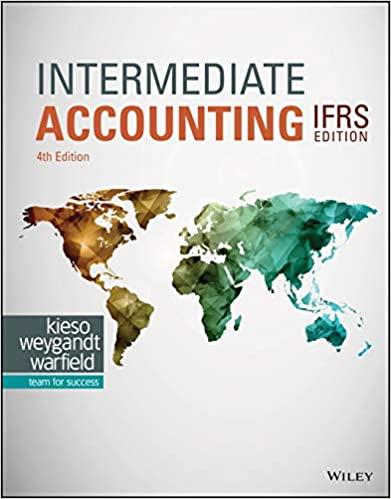Answer the following multiple-choice questions. 1. IFRS stands for: a. International Federation of Reporting Services. b. Independent
Question:
Answer the following multiple-choice questions.
1. IFRS stands for:
a. International Federation of Reporting Services.
b. Independent Financial Reporting Standards.
c. International Financial Reporting Standards.
d. Integrated Financial Reporting Services.
2. The major key organizations on the international side are the:
a. IASB and IFRS Advisory Council.
b. IOSCO and the U.S. SEC.
c. London Stock Exchange and International Securities Exchange.
d. IASB and IOSCO.
3. Which governmental body is most influential in enforcing IFRS?
a. Monitoring Board.
b. IFRS Advisory Council.
c. IOSCO.
d. IFRS Foundation.
4. Accounting standard-setters use the following process in establishing international standards:
a. Research, exposure draft, discussion paper, standard.
b. Discussion paper, research, exposure draft, standard.
c. Research, preliminary views, discussion paper, standard.
d. Research, preliminary views, exposure draft, standard.
5. IFRS is comprised of:
a. International Financial Reporting Standards and FASB financial reporting standards.
b. International Financial Reporting Standards, International Accounting Standards, and International Accounting Standards Interpretations.
c. International Accounting Standards and International Accounting Standards Interpretations.
d. FASB financial reporting standards and International Accounting Standards.
6. The authoritative status of the Conceptual Framework for Financial Reporting is as follows:
a. It is used when there is no standard or interpretation related to the reporting issues under consideration.
b. It is not as authoritative as a standard but takes precedence over any interpretation related to the reporting issue.
c. It takes precedence over all other authoritative literature.
d. It has no authoritative status.
7. The objective of financial reporting places most emphasis on:
a. reporting to capital providers.
b. reporting on stewardship.
c. providing specific guidance related to specific needs.
d. providing information to individuals who are experts in the field.
8. General-purpose financial statements are prepared primarily for:
a. internal users.
b. external users.
c. auditors.
d. government regulators.
9. Economic consequences of accounting standard-setting means:
a. standard-setters must give first priority to ensuring that companies do not suffer any adverse effect as a result of a new standard.
b. standard-setters must ensure that no new costs are incurred when a new standard is issued.
c. the objective of financial reporting should be politically motivated to ensure acceptance by the general public.
d. accounting standards can have detrimental impacts on the wealth levels of the providers of financial information.
10. The expectations gap is the difference between:
a. what financial information management provides and what users want.
b. what the public thinks accountants should do and what accountants think they can do.
c. what the governmental agencies want from standard-setting and what the standard-setters provide.
d. what the users of financial statements want from the government and what is provided.
Step by Step Answer:

Intermediate Accounting IFRS
ISBN: 9781119607519
4th Edition
Authors: Donald E. Kieso, Jerry J. Weygandt, Terry D. Warfield





